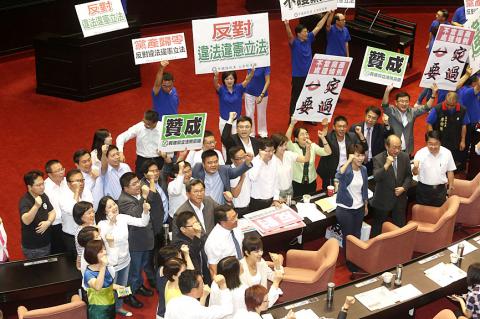The legislature yesterday passed legislation to deal with ill-gotten political party assets, which states that all properties obtained by political parties after 1945 — not including party membership fees and political donations — are to be considered illegal and must be returned to the state.
The Act Governing the Handling of Ill-gotten Properties by Political Parties and Their Affiliate Organizations (政黨及其附隨組織不當取得財產處理條例) was passed after an 11-hour review on the legislative floor in Taipei.
The act states that all assets of a political party will be considered frozen the moment the act is promulgated, with violators facing a jail term of up to five years. Any attempt to avoid, deny or obstruct investigations into party assets could lead to a fine of between NT$100,000 and NT$500,000.

Photo: CNA
The legislature also voted to approve a key provision of the act that stipulates that assets obtained since Aug. 15, 1945, would be subject to the law.
The date listed in the provision, which passed 72 to 31, was chosen because it was the day Japan officially announced its surrender to the Allies, bringing an end to World War II, as well as the day the Chinese Nationalist Party (KMT) took over properties left by the Japanese in Taiwan, Democratic Progressive Party (DPP) caucus whip Wu Ping-jui (吳秉叡) said.
The legislature held an extraordinary session aimed at pushing through the review of the draft, with several last-minute amendments made.
Earlier in the day, the KMT moved to amend the bill’s name to the “act for oversight and management of assets under political parties (政黨財產監督管理條例),” or KMT Legislator Lai Shih-bao’s (賴士葆) suggestion of the “act on handling the Chinese Nationalist Party’s assets (中國國民黨黨產處理條例).”
Lai said his suggestion was because the draft was primarily aimed at the KMT’s assets, adding that it should be named based on what it is seeking to do.
The DPP moved to amend the name of the draft from the “act on handling ill-gotten party assets” (不當黨產處理條例草案) to the approved version to include assets held by the KMT’s affiliate organizations, such as the China Youth Corps and the National Women’s League of the Republic of China, as the funding of these organizations has always been included in the party’s fiscal budget.
Presidential Office spokesman Alex Huang (黃重諺) said that President Tsai Ing-wen (蔡英文) was glad to hear the news that the act had been passed and wished to commend the entire Legislative Yuan for its hard work in preparing and passing the legislation for the benefit of nation.

The CIA has a message for Chinese government officials worried about their place in Chinese President Xi Jinping’s (習近平) government: Come work with us. The agency released two Mandarin-language videos on social media on Thursday inviting disgruntled officials to contact the CIA. The recruitment videos posted on YouTube and X racked up more than 5 million views combined in their first day. The outreach comes as CIA Director John Ratcliffe has vowed to boost the agency’s use of intelligence from human sources and its focus on China, which has recently targeted US officials with its own espionage operations. The videos are “aimed at

STEADFAST FRIEND: The bills encourage increased Taiwan-US engagement and address China’s distortion of UN Resolution 2758 to isolate Taiwan internationally The Presidential Office yesterday thanked the US House of Representatives for unanimously passing two Taiwan-related bills highlighting its solid support for Taiwan’s democracy and global participation, and for deepening bilateral relations. One of the bills, the Taiwan Assurance Implementation Act, requires the US Department of State to periodically review its guidelines for engagement with Taiwan, and report to the US Congress on the guidelines and plans to lift self-imposed limitations on US-Taiwan engagement. The other bill is the Taiwan International Solidarity Act, which clarifies that UN Resolution 2758 does not address the issue of the representation of Taiwan or its people in

US Indo-Pacific Commander Admiral Samuel Paparo on Friday expressed concern over the rate at which China is diversifying its military exercises, the Financial Times (FT) reported on Saturday. “The rates of change on the depth and breadth of their exercises is the one non-linear effect that I’ve seen in the last year that wakes me up at night or keeps me up at night,” Paparo was quoted by FT as saying while attending the annual Sedona Forum at the McCain Institute in Arizona. Paparo also expressed concern over the speed with which China was expanding its military. While the US

SHIFT: Taiwan’s better-than-expected first-quarter GDP and signs of weakness in the US have driven global capital back to emerging markets, the central bank head said The central bank yesterday blamed market speculation for the steep rise in the local currency, and urged exporters and financial institutions to stay calm and stop panic sell-offs to avoid hurting their own profitability. The nation’s top monetary policymaker said that it would step in, if necessary, to maintain order and stability in the foreign exchange market. The remarks came as the NT dollar yesterday closed up NT$0.919 to NT$30.145 against the US dollar in Taipei trading, after rising as high as NT$29.59 in intraday trading. The local currency has surged 5.85 percent against the greenback over the past two sessions, central